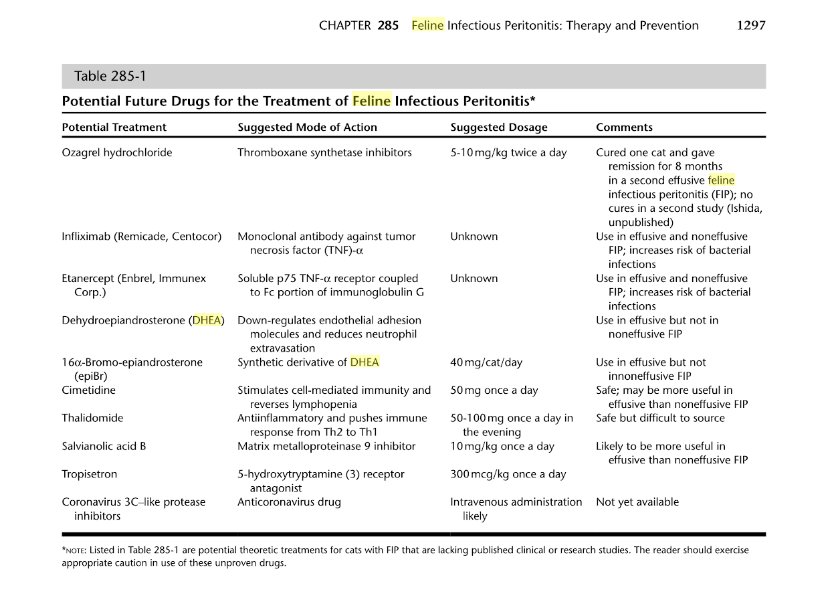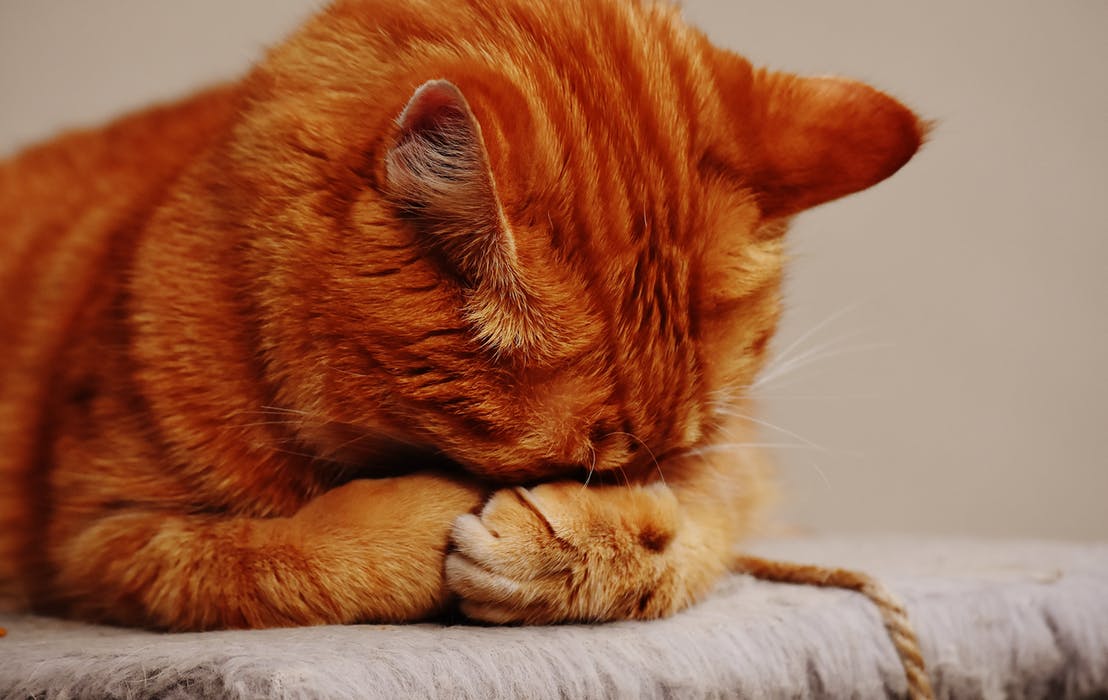Cornell University on Feline Infectious Peritonitis
Which swings right into the idea of using DHEA in felines for viral infections, notably FIV and FIP. There’s solid science that says it may work.

Study which shows DHEA supplementation may help with FIV Infections.
Article by a lady who is used DHEA in a cat for kidney issues. With success. I mean, who knows. The article’s pretty good, though.
NAC – acetyl-cysteine seems to work synergistically with DHEA in cats. Interesting
1. Vet Immunol Immunopathol. 1995 May;46(1-2):159-68.
Dehydroepiandrosterone inhibits replication of feline immunodeficiency virus in
chronically infected cells.
Bradley WG(1), Kraus LA, Good RA, Day NK.
Author information:
(1)All Children’s Hospital, Laboratory of Retrovirology, St. Petersburg, FL
33701, USA.
Dehydroepiandrosterone (DHEA) is a steroid hormone produced by the adrenal cortex
that serves as an intermediary in sex steroid synthesis. DHEA is produced in
abundance by humans and most other warm-blooded animals. Based upon previous
reports demonstrating the antiviral and immunostimulatory activities of DHEA and
DHEA-sulfate (DHEAS) we sought to determine whether introduction of these
compounds would affect replication of feline immunodeficiency virus (FIV) in
chronically infected cells. When cell number, cell viability, cellular DNA
synthesis, and levels of FIV reverse-transcriptase (RT) were measured in cell
cultures treated with various dilutions of DHEA or DHEAS it was found that the
production of FIV RT was inhibited by DHEA at levels where cellular viability and
DNA synthesis were not affected. At the concentrations tested DHEAS did not
inhibit FIV replication or impact on cellular viability or proliferation.
PMID: 7542411 [Indexed for MEDLINE]
https://www.lifeextension.com/magazine/2003/5/report_pet/Page-02
It was five long days until the results came back. By then, Jack was barely hanging on. The report showed that Jack’s kidneys were inflammed for no apparent reason. Little grains created by the immune system were filling up his kidneys, blocking the delicate filtering system. Something was needed that could counteract the inflammatory process. The vet decided that Jack needed an intensive program starting with N-acetylcysteine (NAC).
NAC is a form of the amino acid, cysteine, with multiple kidney-protective actions. The research on what NAC can do for the kidney (and the liver) is scientifically well-documented. In one recent study, researchers in Italy demonstrated that NAC normalizes creatinine levels in rodents with kidney failure. It reverses inflammation and restores filtration. Similar findings are reported by French researchers when NAC is given as a pretreatment before experimental kidney damage in rats. Without NAC, there is a 68% reduction in the ability of the kidneys to do their job. With it, the loss of kidney function is only 29%. A third study confirms that an infusion of NAC before and after experimental kidney damage doubles the kidney filtration rate. NAC is strong medicine for the kidneys. It has no adverse side effects, even when small animals like cats are given a human dose.

Above: Four references to cat toxicity with DHEA and it’s non toxic (unless you fail to read anything on it before you answer the question here.
The veterinarian started Jack on 100 mg of NAC twice a day, plus a new diet of raw beef and chicken and 100 mg of DHEA (dehydroepiandrosterone). DHEA is critical for an important kidney enzyme known as sulfotransferase. People with kidney disease have depleted levels of DHEA. Research shows that DHEA and NAC probably work synergistically, which is why they were given together.
Within 24 hours of receiving NAC and DHEA, Jack began eating like a normal cat. He continued to vomit for several days (a side effect of kidney failure), but two weeks from the date of surgery, his BUN had dropped from 152mg/dl to 45.6mg/dl and he was up and around. At that point, the supplements were cut in half. A month later, Jack’s blood tests were normal. That was over a year ago and Jack is still doing great. He is maintained on a high-protein diet along with 50 mg of NAC and 25 mg of DHEA a day.
An article talks about how DHEA may contribute to feline urological syndrome.
The bulk of the article was based on this study:
14. Caston HT. Stress and the feline urological syndrome. Feline Pract. (1973) 4:14–22.
and
32. Johnstone I, Bancroft B, McFarlane J. Testosterone and androstenedione profiles in the blood of domestic tom cats. Anim Reprod Sci. (1984) 7:363–75. doi: 10.1016/0378-4320(84)90021-6
Author fails to note that altered cats produce NO DHEA and that the first study was conducted in 1973 and the study structure and results may have been sub par.
Also failed to note that most of what the Johnstone study deals with is in INTACT male cats.
From https://www.justanswer.com/cat-health/6uru6-cat-found-swallowed-7-keto-dhea-supplement-25-mg.html
My cat found and swallowed a 7-keto dhea supplement (25 mg)
A veterinarian actually wrote the following: (Illustrates the dangers of taking internet-vet advice oh, my, god.
“Dr. Loretta :
Good Morning and welcome to Just answer. I am Dr. Loretta, a licensed veterinarian and I am happy to answer your question.
Dr. Loretta :
This supplement is a steroid that acts to increase metabolism and this is causing your guys system to react with a digestive disturbance and this could also affect his heart. I would not delay in taking your guy to the ER vet. I say this because this amount in his system , even if some was vomited could be life threatening due to this increase heart rate and its affects on other organs. the only other thing you can do is to flush his system at home by giving him Pedialyte, 1-2 ounces every 4 hrs but this may not be enough,. It is safer to have your vet examine him.
Customer:
Thank you. My other computer did not display your answer, but I can see it on this one. I will take him in.
Customer:
Thanks”
———————————————————
##NAC – acetyl-cysteine seems to work synergistically with DHEA in cats. Interesting
———————————————————
